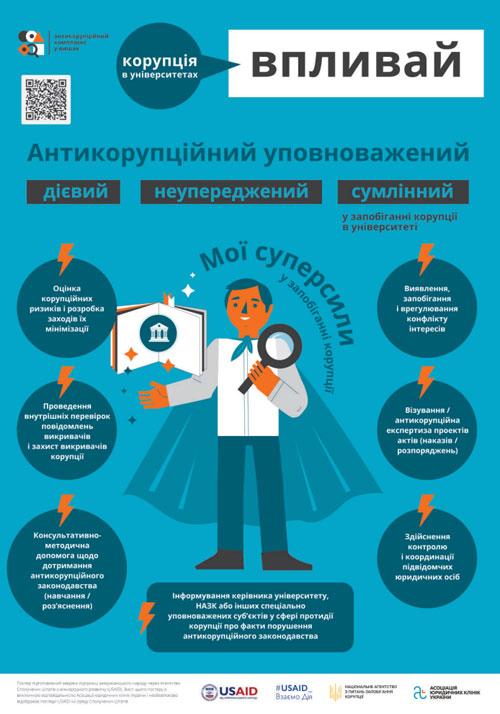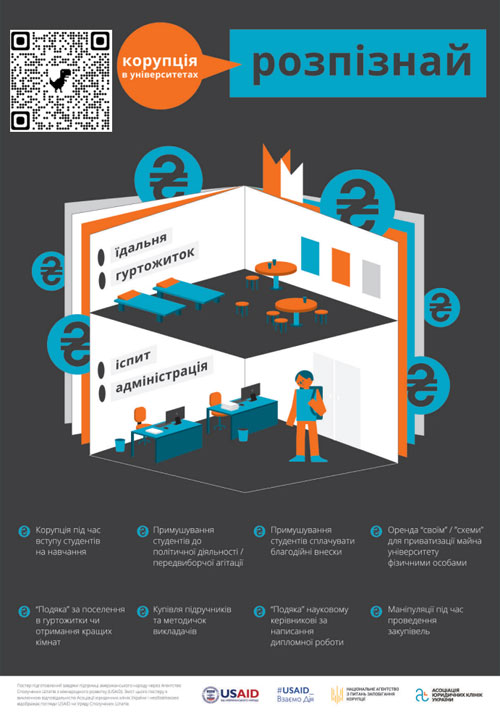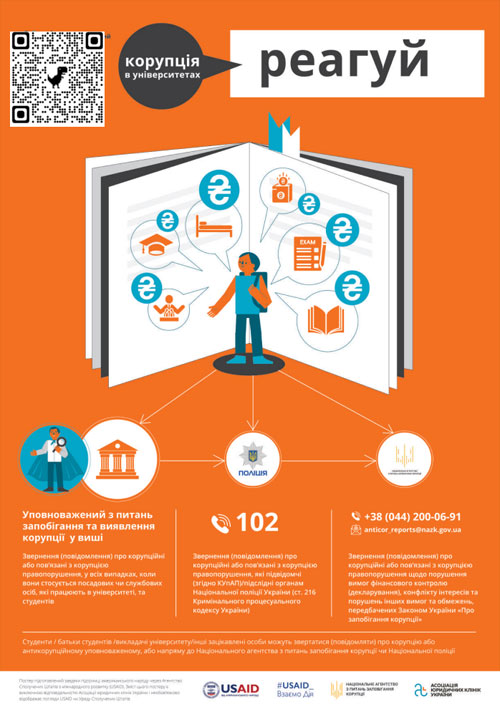🇺🇦 Our country has introduced unprecedented measures to combat corruption, which most post-Soviet countries have not yet been able to implement.
On October 14, 2014, the Verkhovna Rada adopted an “anti-corruption package” of laws. The public demands expressed during the Revolution of Dignity were transformed into the Law “On Prevention of Corruption.” It provided for the creation of the National Agency for Corruption Prevention (NAZK), which formulates and implements state anti-corruption policy. On the same day, a law was passed on the National Anti-Corruption Bureau (NABU) and the Anti-Corruption Strategy, which became the first comprehensive action plan for all authorities to combat corruption.
The new legislation was radically different from the previous one, which was based on Soviet approaches. Rules on conflicts of interest and financial control were established, making it possible to detect illegal enrichment and potential abuse by public officials. The law also established ethical rules for their conduct and introduced legal protection for whistleblowers. Other important anti-corruption safeguards were introduced, including restrictions on moonlighting, combining positions, and receiving gifts. The laws adopted took into account successful international practices and complied with European standards.
🔎 Subsequently, Ukraine introduced electronic declaration of officials' assets and established liability for false declarations and illegal enrichment. Following the NACP and NABU, the SAPO, ARMA, and VAKS began operating, forming a comprehensive anti-corruption infrastructure. All of this ensured gradual progress in the fight against corruption. Although the level of corruption remains high, it has decreased significantly over the years: since 2014, Ukraine has risen 37 positions in the global ranking of the Corruption Perceptions Index, and the proportion of citizens who have had real experience with corruption has more than tripled, from 70.7% to 18.7%.
The independence of anti-corruption bodies remains a key condition for their effective work. Protecting their status, improving their activities, scaling up successful anti-corruption experiences, and reforming the entire system that ensures the rule of law are Ukraine's main tasks on the path to building a capable state and successful European integration 🇺🇦 🇪🇺.
Anti-corruption policy of Igor Sikorsky Kyiv Polytechnic Institute
At Igor Sikorsky Kyiv Polytechnic Institute, the issue of preventing corruption is gradually becoming a systematic direction of management activities. The university's policy in this area is fully consistent with the state policy on creating an honest, transparent, and accountable educational environment. It is consistent with Ukraine's strategic documents, in particular the Anti-Corruption Strategy for 2021-2025, as well as with the priorities set by the National Agency for Corruption Prevention (NAZK).
At the organizational level, KPI has created the position of an authorized person for the prevention and detection of corruption, who coordinates the relevant processes, ensures communication between the university and state institutions, and monitors compliance with anti-corruption standards. The existence of such a position is an indicator of the maturity of the management structure and confirms the university's readiness for transparent self-regulation.
An important result was the formation of a regulatory framework that includes the KPI Anti-Corruption Program, an anti-bribery policy, provisions on the prevention of conflicts of interest, and procedures for reviewing reports of possible corruption offenses. All these documents are publicly available on the university's official website, which emphasizes the principles of openness and transparency.
To ensure effective feedback, communication channels have been created for whistleblowers, including an email address, a Telegram channel, and forms for submitting reports. Confidentiality guarantees are provided to help create a safe environment for reporting violations. This mechanism builds trust among members of the university community and meets state standards for the protection of whistleblowers.
KPI pays special attention to educational activities aimed at developing a culture of integrity among students and employees. Every year, anti-corruption quests, creative competitions for International Anti-Corruption Day, thematic trainings, and information campaigns are held. Such initiatives foster the understanding that integrity is not only a legal requirement but also a moral norm in the academic environment.
An important element of the policy is the promotion of academic integrity. KPI has regulations in place to prevent plagiarism, fabrication, and falsification of research results. This allows for the integration of anti-corruption principles into educational and research practices, creating a unified culture of accountability and transparency.
At the same time, KPI's anti-corruption system needs further development. The university's website does not yet provide detailed reports on the results of anti-corruption measures, which makes it difficult to assess the effectiveness of the policy. The mechanism for protecting whistleblowers needs to be strengthened, and external monitoring by independent experts or partner organizations needs to be introduced. It is also advisable to expand anti-corruption work at the level of university faculties and departments, especially in terms of public procurement and personnel decisions.
In conclusion, the anti-corruption policy of Igor Sikorsky KPI demonstrates consistency with the state anti-corruption strategy and a gradual transition from an administrative to a value-oriented approach. The university is forming its own ecosystem of integrity, in which legal, educational, and ethical instruments work in synergy. This approach ensures not only compliance with formal requirements, but also the development of a culture of trust, responsibility, and ethical leadership among both students and university staff.










